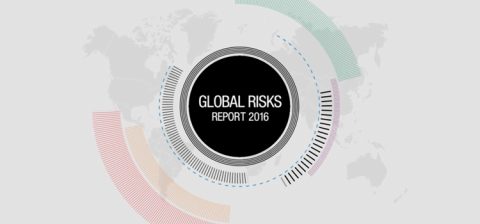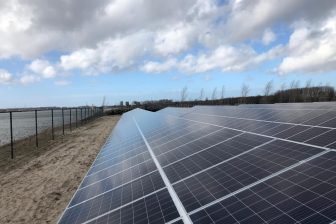
‘Klimaat grootste risico voor wereldeconomie’
15 januari 2016 – Het mislukken van de aanpak van de klimaatverandering is het grootste risico voor de wereldeconomie. Dat stelt het World Economic Forum in zijn Global Risk Report 2016.
Uit het persbericht van het World Economic Forum
‘(…) In this year’s annual survey, almost 750 experts assessed 29 separate global risks for both impact and likelihood over a 10-year time horizon. The risk with the greatest potential impact in 2016 was found to be a failure of climate change mitigation and adaptation. This is the first time since the report was published in 2006 that an environmental risk has topped the ranking. This year, it was considered to have greater potential damage than weapons of mass destruction (2nd), water crises(3rd), large-scale involuntary migration (4th) and severe energy price shock (5th).
 The number one risk in 2016 in terms of likelihood, meanwhile, is large-scale involuntary migration, followed by extreme weather events (2nd), failure of climate change mitigation and adaptation (3rd), interstate conflict with regional consequences (4th) and major natural catastrophes (5th). (…)
The number one risk in 2016 in terms of likelihood, meanwhile, is large-scale involuntary migration, followed by extreme weather events (2nd), failure of climate change mitigation and adaptation (3rd), interstate conflict with regional consequences (4th) and major natural catastrophes (5th). (…)
The Global Risks Report 2016 also examines the interconnections among the risks. Here, data suggests a convergence may be occurring, with a small number of key risks wielding great influence. (…) Knowledge of such interconnections is important in helping leaders prioritize areas for action, as well as to plan for contingencies. “We know climate change is exacerbating other risks such as migration and security, but these are by no means the only interconnections that are rapidly evolving to impact societies, often in unpredictable ways. Mitigation measures against such risks are important, but adaptation is vital,” said Margareta Drzeniek-Hanouz, Head of the Global Competitiveness and Risks, World Economic Forum. (…)
“Climate change is exacerbating more risks than ever before in terms of water crises, food shortages, constrained economic growth, weaker societal cohesion and increased security risks. Meanwhile, geopolitical instability is exposing businesses to cancelled projects, revoked licenses, interrupted production, damaged assets and restricted movement of funds across borders. These political conflicts are in turn making the challenge of climate change all the more insurmountable – reducing the potential for political co-operation, as well as diverting resource, innovation and time away from climate change resilience and prevention,” said Cecilia Reyes, Chief Risk Officer of Zurich Insurance Group. (…)’
The Global Risks Report 2016 is a tool for stimulating dialogue among policy-makers, business executives and thought leaders around the world. It is also a call to action to improve international efforts at coordination and collaboration to equip institutions to understand, monitor, manage and mitigate global risks, prepare for them and strengthen resilience.
Annual Meeting World Economic Forum
Op 20-23 januari 2016 vindt de Annual Meeting van 2016 plaats. Eén van de onderwerpen is ‘The transformation of Energy’.
Korte videosamenvatting van het rapport (2’13”)
Bronnen
World Economic Forum, persbericht, 14 januari 2016: More Walls, More Warming, Less Water: A World at Risk in 2016
Rapport: The Global Risks Report 2016, 11th Edition (pdf, 98 pag.)
Executive Summary
Programma World Economic Forum Annual Meeting, 20-23 januari



